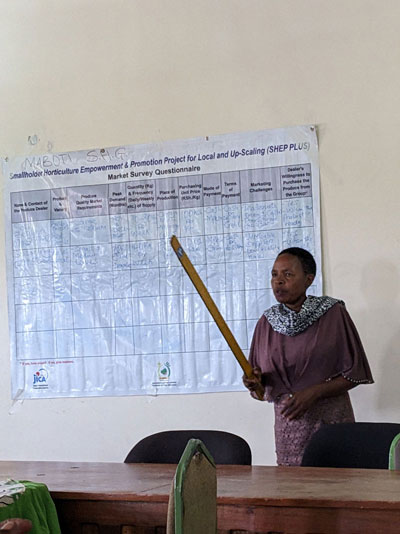Project News Volume 30
As a JICA volunteer of community development, I’m conducting agricultural support activities, such as teaching children on farming at agriculture club in primary school and promoting organic farming for local farmers to increase their income. Since I’m planning to conduct training for farmer groups and market survey with children as part of my activities, I decided to participate in the SHEP Biz training program to learn how to share my knowledge and experience during the training and how to conduct market survey.
The training called the Joint Extension Staff & Farmers Dual (2) Gender (JEF2G) training (hereinafter referred to as SHEP training) which I attended was for officers and farmers for Nyamira county. I felt that the training was full of “motivation”, “passion” and “enthusiasm”. Each participant seemed to have a goal in mind, and is "motivated" to learn and know new things. “Passion" to apply what they learn to their environment and improve their living. And, the "enthusiasm" of the entire group, regardless of age, sex, gender, farmers, officers, and those who organized the training share their opinions without distinction and to create better learning. It was a long and intense 5 days of training, where I once again felt the joy of learning, the pleasure of knowing, and the importance of cooperation.
What I learnt the most through SHEP training was how to conduct training and market survey. It is common for the lectures to speak and teach one way in the training. However, in SHEP training, presenters often said that "we are teachers each other.” And as it said the training was not a one-way teaching. In the SHEP training, both presenters and participants learn and it was not only lecture but learning from practice. I felt that the SHEP training was a place to "share" rather than "teach". It was a reminder that I, too, have much to learn through my activities.
When I heard "market survey," I thought it meant price research, but it was not only price, but also where are crops from, quality such as size, seasonality, demand and supply, and other factors, which participants took time to listen from buyers and retailers in the market. Based on information obtained through market survey, participants selected crops to grow by considering the environment of the area where the farmers live, the size of farm, experiences of production, and other factors. In this way, farmers listen to each other, discuss, think and decide, and take responsibility for their decisions. I felt that these experiences give them a great deal of confidence and encourage them to think further. When I do my activity in farm with children, they only think about the crops they eat. Of course, the knowledge that we can grow our own food is very important. However, money is always necessary to make a living. Therefore, I hope that experiencing market survey from childhood will help them to think about the connection with the economy, even if only a little.
There is an African proverb that says, "If you want to go fast, go alone; if you want to go far, go together.” When I saw how the farmers thought together in the SHEP training, I felt that it was true. Sometimes it is necessary and important to go by alone, but through the SHEP training, I have been reminded of how important it is to work together. The joy of learning, the pleasure of knowing, and the determination to keep going may also be because we are all here together.

Participants discuss which crops to grow

Participant presented the result of market survey
